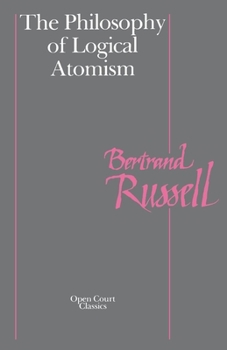The Philosophy of Logical Atomism
Select Format
Select Condition 
Book Overview
Taken from a series of influential lectures delivered by Russell during the second decade of the twentieth century, this is a brilliant introduction to logical atomism and its application to ontology and epistemology.
Bertrand Russell (1872 - 1970). Philosopher, mathematician, educational and sexual reformer, pacifist, prolific letter writer, author and columnist, Bertrand Russell was one of the most influential and widely known intellectual figures of the twentieth century. In 1950 he was awarded the Noble Prize for Literature in 1950 for his extensive contributions to world literature and for his "rationality and humanity, as a fearless champion of free speech and free thought in the West."
Photo by Photographer not identified (Bertrand Russell (1916). Justice in War-Time.) Public domain], via Wikimedia Commons.






